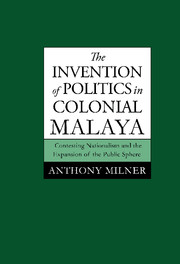 The Invention of Politics in Colonial Malaya
The Invention of Politics in Colonial Malaya Book contents
- Frontmatter
- Contents
- Preface
- Map of Malaya
- Introduction: Colonialism, Nationalism and Contest
- 1 The Ancien Régime: Described and Condemned
- 2 Establishing a Liberal Critique
- 3 A Description of the Real World: Expanding Vocabularies
- 4 Conceptualizing a Bangsa Community: A Newspaper of Moderate Opinions
- 5 Building a Bourgeois Public Sphere
- 6 Ideological Challenge on a Second Front: The Kerajaan in Contest with Islam
- 7 Answering Liberalism: Islamic First Moves
- 8 Kerajaan Self-reform: Chronicling a New Sultanate
- 9 Practising Politics in the Mid-Colonial Period
- 10 Surveying the Homeland: Sedar and Dialogic Processes
- Conclusion: The Malay Political Heritage
- Select Bibliography
- Index
4 - Conceptualizing a Bangsa Community: A Newspaper of Moderate Opinions
Published online by Cambridge University Press: 18 December 2009
- Frontmatter
- Contents
- Preface
- Map of Malaya
- Introduction: Colonialism, Nationalism and Contest
- 1 The Ancien Régime: Described and Condemned
- 2 Establishing a Liberal Critique
- 3 A Description of the Real World: Expanding Vocabularies
- 4 Conceptualizing a Bangsa Community: A Newspaper of Moderate Opinions
- 5 Building a Bourgeois Public Sphere
- 6 Ideological Challenge on a Second Front: The Kerajaan in Contest with Islam
- 7 Answering Liberalism: Islamic First Moves
- 8 Kerajaan Self-reform: Chronicling a New Sultanate
- 9 Practising Politics in the Mid-Colonial Period
- 10 Surveying the Homeland: Sedar and Dialogic Processes
- Conclusion: The Malay Political Heritage
- Select Bibliography
- Index
Summary
By the end of the nineteenth century an increasingly confident liberalism was challenging the Malay royal courts. Now familiar with British doctrines and practices, liberal ideologues began to formulate a detailed program for Malay society. They conceptualized a new, bangsa, community and it contrasted strongly with the hierarchical, ceremonial kerajaan. I use the word ‘conceptualized’ rather than ‘imagined’ because it conveys better the purpose and energy with which Malay writers engaged in the construction of a new form of community. The bangsa was certainly an intellectual rather than a natural construction, but the concept of imagination tends to disguise the anxiety, the experimentation, the contest and the sheer intellectual difficulty faced by those who relinquished their loyalty to older forms of community and constructed a new form. In examining the writing of Mohd. Eunos Abdullah, we learn something about this process, particularly about the creative significance of old vocabulary.
In one sense, the turn of the century was a time of retreat not only for the Malays but for most Asian peoples, a period when European imperial authority was being consolidated all over the East. But the triumph of the West also entailed a victory of ideas, and the propagators of the ideas were not merely Europeans. By 1900, those who had begun to appropriate the doctrines of liberal Europe to undermine the ancien régime in Malaya and other lands – even if they themselves were victims of colonialism – sensed that they possessed a formidable ideological armoury. Colonialism was frequently feared and disliked but, not surprisingly, the doctrines which seemed to underpin the startling achievements of late nineteenth-century Europe were of absorbing interest.
- Type
- Chapter
- Information
- The Invention of Politics in Colonial MalayaContesting Nationalism and the Expansion of the Public Sphere, pp. 89 - 113Publisher: Cambridge University PressPrint publication year: 1995


